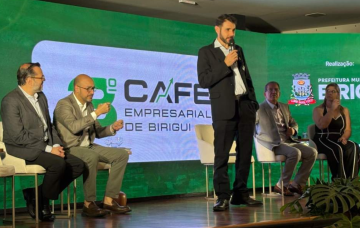
1 October 2025 | Birigui, Brazil
UNEP International Environmental Technology Centre (UNEP-IETC), in partnership with the General Secretariat of the Presidency of the Republic of Brazil and the Municipality of Birigui, Brazil, has launched a pioneering pilot project to design a circular economy model for urban waste management in the country, building on findings and insights from UNEP’s Global Waste Management Outlook 2024 (GWMO).
The project will develop a programme proposal for a circular model of waste management in Birigui, state of São Paulo, outlining a practical roadmap to reduce waste generation, enhance recycling and resource recovery and strengthen social inclusion in waste governance. By focusing on waste prevention, resource recovery and reuse, the initiative aims to reduce environmental impacts while generating economic and social benefits, in line with GWMO’s findings.
The launch brought together around 300 participants, including local authorities, businesses, researchers and community members, to explore innovative approaches that move beyond traditional “collect–dispose” approaches toward circular and resource-efficient solutions.
The project will include:
- A diagnostic assessment of the Birigui’s current waste management system, identifying key challenges and opportunities;
- Strategies for waste prevention, material recovery, and improved recycling practices;
- Investment and governance mechanisms to mobilize public and private resources;
A climate impact analysislinks to potential funding opportunities; and - A roadmap outlining short- and long-term implementation actions.
Consultations with local authorities, the private sector, civil society, and community organizations will ensure that the programme reflects Birigui’s specific context and priorities.
UNEP, —through its International Environmental Technology Centre (IETC) in Osaka and National Office in Brasília —will provide technical and operational support throughout the programme development and assist in mobilizing funding opportunities for its implementation. The General Secretariat of the Presidency will provide institutional support, while the Municipality of Birigui will lead local coordination and stakeholder engagement.
According to GWMO 2024, global municipal solid waste generation is projected to rise from 2.1 billion tons to 3.8 billion tons by 2050, with an annual cost exceeding US$600 billion. Transitioning to a circular economy could generate a net global gain of more than US$100 billion by mid-century.
The Birigui pilot is a concrete step toward realizing this vision —demonstrating how cities can re-think their culture on waste management and redesign waste systems to reduce waste generation, avoid pollution and conserve resources, while creating new opportunities for employment and innovation.
Equipe técnica da ONU se reúne com técnicos da Prefeitura de Birigui
